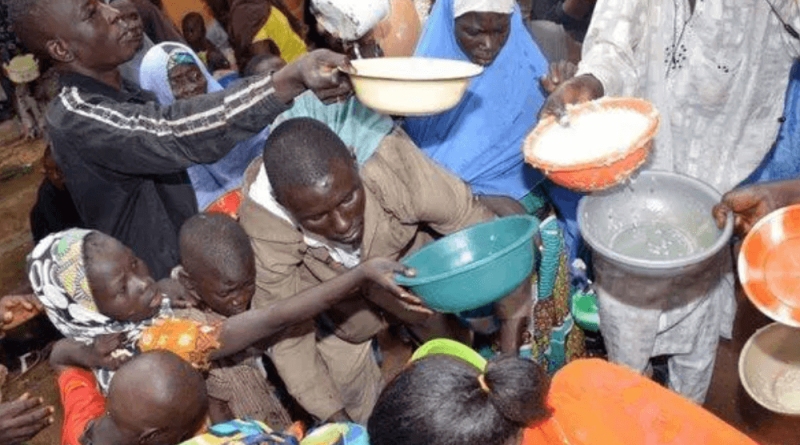FG reaffirms commitment to zero hunger as FAO warns 34m Nigerians at risk of food insecurity by mid-2026
The federal government has reaffirmed its commitment to ensuring that every Nigerian has access to safe and nutritious food, even as a new report by the Food and Agriculture Organization (FAO) warns that over 34.7 million Nigerians could face acute food insecurity by mid-2026 if urgent action is not taken.
The warning comes from the October 2025 Cadre Harmonisé (CH) Food and Nutrition Insecurity Analysis, jointly released by the FAO and the Federal Ministry of Agriculture and Food Security (FMAFS).
The assessment, which covers 27 states and the Federal Capital Territory (FCT), reveals that food insecurity in Nigeria remains at crisis levels, affecting millions of households, including over 650,000 internally displaced persons (IDPs) in Borno, Sokoto, and Zamfara States.
Speaking at the official presentation of the report on Friday, in Abuja, Marcus O. Ogunbiyi, permanent secretary, Federal Ministry of Agriculture and Food Security, described the findings as “a wake-up call for coordinated and sustained action.”
“The data tells us where hunger is deepening, where nutrition outcomes are deteriorating, and where interventions are most urgently needed.”
According to the FAO report, 27.2 million Nigerians are already facing Crisis (CH Phase 3) or worse levels of food insecurity, a figure projected to rise to 34.7 million between June and August 2026, when the country enters its lean season.
In Adamawa State alone, about 1.4 million people could face Crisis or Emergency levels of food insecurity by mid-2026. The report also highlights that over 55% of households are surviving by reducing meal quantity or quality, borrowing money, or skipping meals altogether.
The FAO warns that persistent insecurity, high inflation, poor market access, and climate shocks are driving the worsening situation. Despite a marginal easing of inflation and consumer prices, the cost of complementary foods such as oils, dairy, and condiments remains 35% above average, while the cost of fertilizers and agrochemicals has surged by 56%, discouraging dry-season farming participation.
“These data and the analysis are indispensable for anticipating emerging food security challenges, guiding resource allocation, and ensuring timely interventions to protect vulnerable populations,” Ogunbiyi stated.
He added that the findings will guide the implementation of key government programmes, including the National Agricultural Growth Scheme and Agro-Pocket (NAGS-AP) and the National Food Security and Nutrition Emergency Plan, aimed at supporting vulnerable households and farmers.
“The Federal Ministry of Agriculture and Food Security remains steadfast in its mission to build a resilient, inclusive, and sustainable food system that ensures access to safe and nutritious food for all Nigerians,” he said.
The nutrition situation, according to the FAO, ranges from Alert (Phase 2) to Serious (Phase 3) and Critical (Phase 4) across the Northwest, Northeast, and parts of North Central Nigeria, with Borno and Yobe States recording the highest levels of acute malnutrition, particularly in Maiduguri, Jere, Mobbar, and central Borno. Some areas, including Jibia and Mashi in Katsina State, have crossed into critical thresholds.
In his remarks, Hussein Gadain, FAO Country Representative, commended Nigeria for marking 10 years of Cadre Harmonisé implementation, noting that Ekiti State joined the process for the first time, bringing the total to 27 participating states.
“We encourage more states to join this analysis. Ekiti’s participation is a powerful example of what commitment can achieve,” Gadain said. He added that “conflict, economic pressures, and climate extremes continue to undermine livelihoods,” calling for stronger policy responses and resilience strategies to safeguard farmers and households.
Ogunbiyi also commended the National Cadre Harmonisé Technical Committee and development partners — including the FAO, World Food Programme (WFP), Famine Early Warning Systems Network (FEWS NET), Save the Children, and UNICEF — for their technical and financial support.
“Your collective efforts ensure that Nigeria continues to serve as a model for regional coordination and data-driven early warning systems within the ECOWAS framework,” he said.
Read also: Over 34 million Nigerians to face acute food insecurity by mid-2026 – FAO report
He emphasised that the Cadre Harmonisé outcomes will feed into Nigeria’s contribution to the upcoming Regional Food and Nutrition Security Outlook under the CILSS and ECOWAS framework, reaffirming the country’s leading role in shaping West Africa’s food security agenda.
“The emerging trends continue to call for decisive action,” Ogunbiyi warned. “Climate variability, insecurity in food-producing areas, and rising input costs are aggravating food and nutrition insecurity. Addressing these challenges demands a coordinated, multi-sectoral response that links agriculture, health, social protection, and economic planning.”
Declaring the workshop open, the Permanent Secretary reaffirmed the ministry’s commitment to evidence-based policymaking and cross-sectoral collaboration.
“Together, let us continue to strengthen the analytical foundations that support Nigeria’s pathway toward zero hunger and improved nutrition for all,” he concluded.

